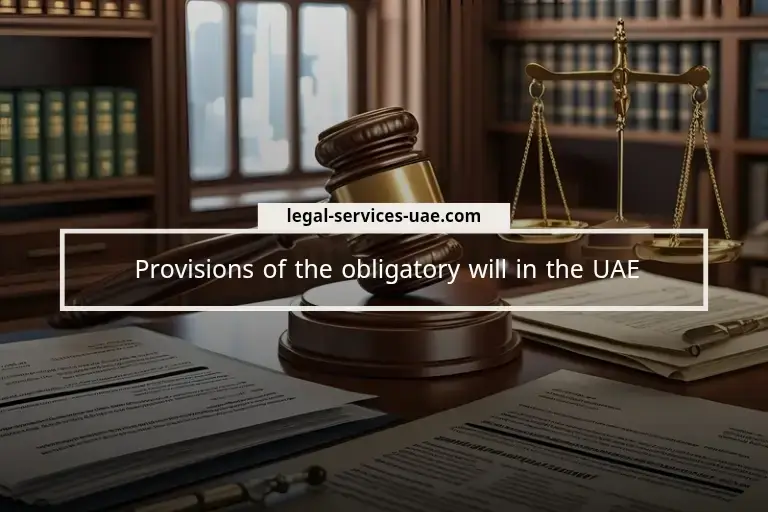Understanding the provisions of the obligatory will in the UAE, is crucial for anyone planning their estate. These mandatory clauses ensure beneficiaries receive their legal share, protecting family rights and upholding Islamic inheritance principles.
In this article, we clarify exactly which provisions of the obligatory will in the UAE are required, how they function in practice, and why legal precision matters—so you can confidently secure your legacy.
Need a legal consultant about Will issues? Click now on the WhatsApp icon below.
فهرس المقال
What Is the Provisions of the Obligatory Will in the UAE?
The term “obligatory will” refers to the compulsory bequests mandated under UAE law and Shariah, ensuring designated heirs receive their fixed inheritance shares. It’s also known as a mandatory testament or fixed-inheritance directive.
Core Provisions of the Obligatory Will in UAE
To be valid, your estate planning must include these essential legal elements:
- Specifying the legatee: The legatee may be a specific living person, a fetus in hiding, or a limited or unlimited category.
- Fixed Share Clauses: Specify exact percentages according to Federal Law No. 5/1985 and Shariah guidelines.
- Valid Testator Declaration: Include confirmation of mental capacity and free intent at signing.
- Witness Requirements: Typically two Muslim, adult, sound-minded witnesses must sign.
- Legal Language and Format: Arabic form is essential, or certified Arabic translation must be attached.
- Registration Proof: Registered with the UAE Notary Public, Ruler’s Court, or DIFC Court (non-Muslims).
Each of these provisions of the obligatory will in UAE safeguards your testament against disputes and invalidation.
Legal Implications & Enforceability
Including the mandatory clauses protects against legal challenges like:
- Disinheritance claims by excluded heirs
- Will disputes over unclear shares
- Judicial interventions by UAE courts to enforce Shariah shares
A properly drafted obligatory will ensures your estate is distributed fairly and efficiently.
Common Mistakes to Avoid
Even with good intentions, errors in mandatory will provisions can lead to:
- Missing or vague beneficiary names
- Incorrect percentages conflicting with Shariah (e.g., children’s share)
- Lack of proper witnesses or unregistered documents
- Use of non-Arabic versions without official translation
Making these errors can result in the will being overturned, beneficiaries losing their rights, or probate delays.
How a Lawyer Helps Ensure Compliance
Engaging a qualified UAE inheritance lawyer is vital. Here’s how they add value:
- Legal Drafting: Ensures accurate inclusion of mandatory clauses per UAE law.
- Compliance Audit: Verifies shares match Shariah ratios and law.
- Language Accuracy: Prepares Arabic original or certified translation.
- Witness Coordination: Arranges the required witnesses and notarization.
- Registration Guidance: Completes formal registration with UAE registry.
- Conflict Resolution: Mediates with potential heirs to preempt disputes.
- Estate Administration: Helps execute the will after death, ensuring legal fulfillment.
FAQs
The provisions of the obligatory will in the UAE are not optional formalities—they are legal necessities to ensure fair distribution, avoid disputes, and comply with Islamic inheritance law. A will that includes clearly defined heirs, fixed Shariah-compliant shares, Arabic drafting, witnesses, and proper registration is both enforceable and protective of your legacy. If you’re asking “provisions of the obligatory will in UAE,” now you understand their importance and correct application.
Our experienced inheritance lawyers in Dubai will guide you through every step, contact us now via the WhatsApp icon below.
Was this helpful?
Specialized Legal Content Writer, possessing deep legal knowledge and exceptional ability to demystify legislation and analyze judicial developments. He delivers clear, precise content that helps you understand your legal rights and obligations while empowering you to make informed decisions across diverse legal domains. Working within our expert legal team, he ensures credibility and trustworthiness in every piece of content.



